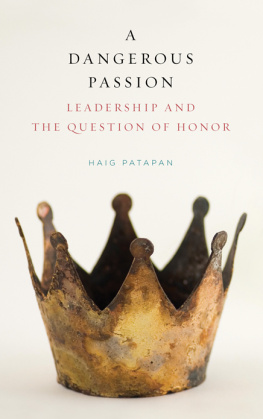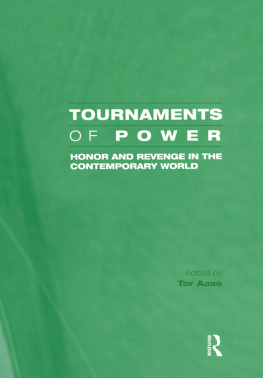Published by State University of New York Press, Albany
2021 State University of New York
All rights reserved
Printed in the United States of America
No part of this book may be used or reproduced in any manner whatsoever without written permission. No part of this book may be stored in a retrieval system or transmitted in any form or by any means including electronic, electrostatic, magnetic tape, mechanical, photocopying, recording, or otherwise without the prior permission in writing of the publisher.
For information, contact State University of New York Press, Albany, NY
www.sunypress.edu
Library of Congress Cataloging-in-Publication Data
Names: Patapan, Haig, 1959 author.
Title: A dangerous passion : leadership and the question of honor / Haig Patapan.
Description: Albany : State University of New York Press, [2021] | Includes bibliographical references and index.
Identifiers: LCCN 2020024807 | ISBN 9781438482798 (hardcover : alk. paper) | ISBN 9781438482811 (ebook)
Subjects: LCSH: Political leadership. | Honor. | Personality and politics.
Classification: LCC JC330.3 . P39 2021 | DDC 303.3/4dc23
LC record available at https://lccn.loc.gov/2020024807
10 9 8 7 6 5 4 3 2 1
To Peter H. Russell, Thomas L. Pangle, Richard W. StaveleyPREFACE
H onor is a dangerous passion that fuels the ambitions of glory seekers to pursue immortality through preeminence, tyranny, and empire. It is also the source of good leadership that is founded on noble ambition and sacrifice for the common good. These two faces of honor show how leadership and honor are mutually constitutive and that their interrelational dynamic fundamentally shapes the character of political practice. Our contemporary blindness to this leadership-honor dynamic and neglect of the significance of honor and shame in modern politics has caused us to fundamentally misunderstand the nature of leadership. In this book I examine three influential yet divergent and contending accounts of the leadership-honor dynamic to better understand modern leadership and to show how insights from these debates can illuminate a series of pressing contemporary political challenges.
Few, if any, of us are indifferent to the opinion of others. On the contrary, it seems almost impossible not to think of others in all aspects of our lives. Though interested in what others may think in general, we are especially concerned with their good opinion of us. The desire that people should think well of us often animates what we think and do. Frequently it is linked with our hopes and expectations of some discernable advantages, though it would seem that our desires are not always defined by such simple instrumental calculations. Consequently, those who are vain long to be seen and acknowledged as beautiful, the virtuous want to be known as good and noble, and the proud as preeminent and superior. Though some need and seek the good opinion of everyone, and therefore the love of the whole world, most of us will respect and therefore value the views of some select few more than others. We are most sensitive to the opinions of those we admire when in their company, though their absence does not attenuate their influence; they are often in our thoughts, praising, censuring, and passing judgment. Our longing to be loved and admired by those we respectthe passion of honoris therefore essentially a social passion because it can only exist and be satisfied with and through others. It is also political because each political community defines and therefore determines what is honorable by bestowing the dignity of citizenship, and equally importantly, defining in subtle detail, through laws, conventions, and customs, what is honorable and shameful.
Honor and shame therefore permeate and animate all aspects of political life. They are especially important, however, for leaders, particularly those who are responsible for discharging the authority of foremost political offices. Honor presents two distinct yet interrelated challenges to leaders. Honor of each individual, born or derived from citizenship, or in its modern source and articulation, the dignity of a free and autonomous human being, requires acknowledgement, recognition, and respect from each other and especially from leaders. Though the precise demands of such esteem and deference will obviously vary according to the specific orders of honor and exigencies of circumstances, the unavoidable truth is that all leadership demands acute sensitivity in giving proper honor or respect to followers, not only because they deserve it, but also in order to achieve any success or advantage in leading. Above all, leaders must not dishonor followers by shaming them or slighting all those things that they value, especially family, friends, homeland. The importance of honor therefore explains why leaders cannot simply rule the way a shepherd may care for a flock, or a farmer grow crops, ordering, arranging, and distributing as they see fit, irrespective of the opinions, wishes, and hopes of their followers.
This specific demand for honor is compounded and complicated by the allure of honor for leaders. Those who long for honor above all, because it cannot be bought and therefore seems superior to mere gain, and because it seems impervious to time, leaving a legacy beyond their lives, are naturally drawn to political office. Politics most comprehensively satisfies the desire for honor because the office itself bestows honor, and because leadership and exercise of authority allow the greatest display of virtue, which is admirable and praiseworthy, for now and into the future. In seeking office and discharging its duties, leaders are always thinking of their honor, present and futurewhat their followers think of them and how they will be remembered. This powerful longing for honor has far-reaching consequences for good leadership.
Leaders who seek office, to the extent that they also seek honor, will be defenders of what is honorable. They will be guardians of those laws and conventions that define the noble and the good, the just and the unjust, and therefore the codes of honor and shame that define and shape the lives and practices of all communities. In defending, and in crucial respects sacrificing, to defend these principles we see the noble and beautiful face of honor. It is the honor of the patriot who gives all for his country. This admirable face of honor can also have its darker aspect. A my country right or wrong disposition can sometimes be deaf to reasonable persuasion and intransigently resistant to change, while those leaders who want to gain the love or admiration of their followers may be tempted to pander to their wishes, appearing contemptible in their attempts to please, or, more seriously, neglecting their office by not pursuing unpopular but necessary actions.
This noble face of honor should be distinguished from its other aspect, which we call glory. The desire for honor will in some manifest itself in a longing for excellence in virtue. In these cases, the love of honor points to glory as recognition of superiority in excellence. Consequently, glory or preeminence in virtue introduces and justifies love of victory. Such a love for distinction, the honor of being first or the winner, is the source of the noble ambition that manifests itself in magnanimous actions for the public good and is the source of grand enterprises and major innovations. Yet the desire for preeminence is so powerful in some that when frustrated they may be tempted to question and even overturn what is honorable. Honor as glory is therefore also the most dangerous passion. Glory seekers who are the great political founders and innovators are also potentially shameless tyrants, hubristically disregarding what is proper and honorable to satisfy their indefatigable passion for preeminence.










